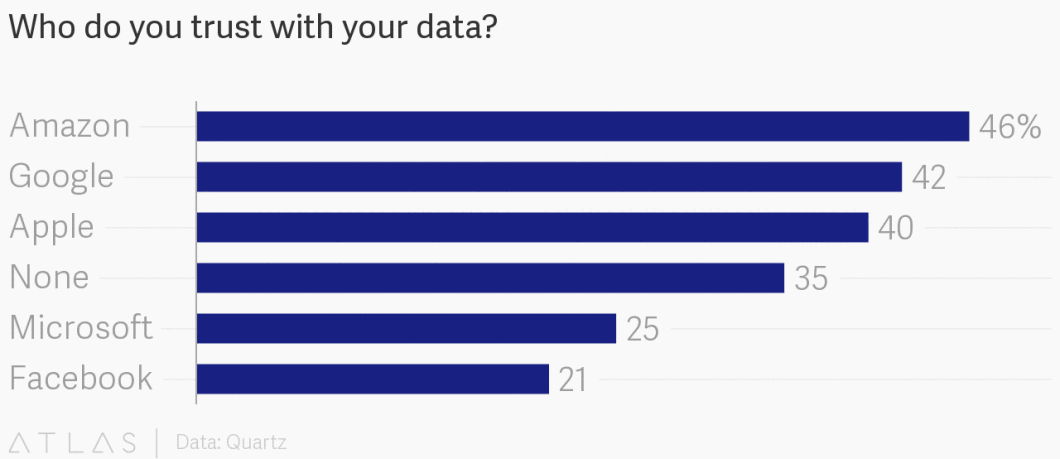Everyone Gives Facebook Their Data, But Nobody Trusts Facebook With It Image courtesy of Facebook
Facebook is one of the biggest companies in the entire world. More than 26% of the entire population of Earth uses it, in one way or another, including roughly 230 million Americans… but it seems that the vast majority of us are aware that although we let Facebook have our data, we shouldn’t trust them with it.
Barely 2 in 10 users
The website Quartz ran a survey of its readers asking which tech companies folks trusted the most, or least, with their personal information.
The survey presented a list of 25 technology brands, from which participants could choose as many or as few as they wanted.
Not a single one of the companies on the list had earned the trust of a majority of respondents. The highest-ranking was Amazon, with 46% of respondents saying they trust the everything store with their data.
Google came in right behind, with 42%, and Apple slid into third, at 40%.

What percentages of respondents trust various tech companies with their data (via Quartz | Atlas)
But barely a fifth — 21% — of respondents to the survey said they trusted Facebook with their data… despite the fact that with more than 2 billion active users and a globe-spanning network of agreements and partners, Facebook has what is likely the largest single pile of user data in the world.
A significant number of participants, however, were (probably correctly) paranoid: 35% of respondents trusted none of the companies on the list with their data.
Quartz points out, however, that those are worldwide numbers. When broken down to just U.S. responses, the differences are even more stark.
In the states, Amazon does just manage to hit that 50% trust threshold, and Apple and Google’s second- and third-place positions are reversed at 41% and 42% respectively.
But Americans trust Facebook even less than the global average, with only 19% of U.S. responses saying they trust Facebook with their data.
Not getting better
Plenty of people had uneasy feelings about the sheer volume of data Facebook has access to long before 2017. But in the last year, since the 2016 U.S. election, unease has continued to grow amidst accusations of foreign interference in the American campaign season.
That lack of trust Americans have in Facebook as an institution is now spreading to places where the company can’t ignore it anymore — like Congress.
After significant pressure, Facebook agreed to share 3,000 political ads with Congress. The House and Senate Intelligence Committees, as well as the Senate Judiciary Committee, are receiving data about the content of the ads, as well as information about who purchased them, how many users (and in what states) saw them, how they were targeted, and so on.
Facebook has issued a lengthy Q&A about the ads, in which the company concludes, “We strongly believe in free and fair elections. … We’re fast developing both standards and greater safeguards against malicious and illegal interference on our platform.”
The company also issued a promise to try and make advertising more “transparent.”
Facebook, however, isn’t just issuing those promises as online press releases. The company has also put them on a full-page ad in the New York Times to try to convince the public (or at least, that sliver of it that reads the NYT on paper) that it will do better going forward.
In the meantime, however, the company’s capacity to track you, and use the data how it likes, keeps growing apace.
Want more consumer news? Visit our parent organization, Consumer Reports, for the latest on scams, recalls, and other consumer issues.

